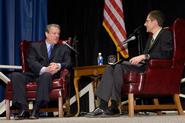
Al Gore, the 45th vice president of the United States, was the 15th lecturer in the Sacerdote Great Names Series at Hamilton College on Thursday, April 26, in the Margaret Bundy Scott Field House. Mr. Gore's lecture on the threat of global warming, "An Inconvenient Truth," was accompanied by the multi-media presentation on which his best-selling book and Academy Award-winning film of the same name are based. Gore asked those in attendance to take on global warming, calling it "the most dangerous crisis we have ever faced in our civilization."
Hamilton College President Joan Hinde Stewart introduced former Vice President Gore, lauding his long career of public service. "What interests us most tonight," she said, "is the courageous and determined way he has turned disappointment in the 2000 presidential election into a crusade against global warming." President Stewart noted the commitment of the Hamilton community to sustainability, including the recent certification of the Skenandoa House by the U.S. Green Building Council, and her recent signature to the American College and University Presidents Climate Commitment. She called Hamilton's commitment to combating climate change "a part of Mr. Gore's legacy."
Former Vice President Gore came on stage to a standing ovation from the capacity crowd in the Margaret Bundy Scott Field House. Mr. Gore began by recognizing several special guests in the audience including Sherwood Boehlert, the recently retired Republican Congressman from the 24th district of New York, who fought alongside Gore in Congress to bring attention to the issue of climate change. He applauded Congressman Boehlert for seeing global warming as a bipartisan issue. "This is not a political issue, it is a moral issue," he said. "It is not about left and right, but about right and wrong."
Gore described global warming as "the most dangerous crisis we have ever faced in our civilization." He explained that while the word "crisis" conveys a sense of alarm, it is better to think of "crisis" the way that the Chinese and Japanese languages do -- as an instance of both danger and opportunity. "We focus on the danger without seeing the opportunity," he said. "We have to walk through the danger in order to seize the opportunity, and in order to walk through the danger we must recognize it."
He then went on to introduce the "Inconvenient Truth" multi-media presentation that he has delivered across the country and which has been made into a best-selling book and an Academy Award-winning documentary. He explained the scientific phenomena behind the Earth's increases in atmospheric carbon dioxide and the correlated increases in global temperature. Gore then described the various disastrous consequences global warming will have, and is already having, on landmasses, plant and animal life, and on human inhabitation of the planet. "To say this would be a catastrophe is a severe understatement," he said. "If we don't do anything about it, this catastrophe could happen in our lifetime."
The obvious question after seeing the dangers of global warming is whether or not it can be fixed. Gore noted that many people see the problem as too large, but said that we should not go directly "from denial to despair." Instead, he said, we have to use what we now know about global warming to find ways to combat it. "All of the solutions are hard -- but they are all possible." Gore discussed America's triumphs in combating other seemingly immense challenges throughout its history, and said that he believes America also has the potential to overcome this obstacle. He concluded, "Now it is our turn. We have a challenge before us."
After his lecture, Gore answered several questions that were submitted by members of the Hamilton community and read by Onno Oerlemans, professor of English and chair of the college's environmental studies program. In response to a question from Paxton Ramsdell '07 on the responsibilities of colleges, Gore called on today's college students to take the same leading role in the fight against global warming that his generation's college students took in the civil rights movement.
Christie Seever, an employee of Hamilton's Arthur Levitt Public Affairs Center, submitted a question asking Gore about his own lifestyle choices and their effect on global warming. Mr. Gore responded that while he tries to live a carbon-neutral life, he also believes that it is a "waste of time" to criticize specific individuals' behavior when there are merely enmeshed in a civilizational pattern that mandates certain choices.
Professor of French John O'Neal asked Mr. Gore about the absence of global warming from the mainstream political agenda, particularly in the upcoming presidential race. Gore said that he hopes the 2008 campaigns will have a prominent dialogue about global warming, and that he believes it will soon become one of the most important issues on our national agenda. "The truth will carry a moral imperative," he said.
Former Vice President Gore was the 15th guest in the Sacerdote Great Names Series at Hamilton College. The series, which began in 1996 with a lecture by former Chairman of the Joint Chiefs of Staff Colin Powell, is named in recognition of a significant gift from the family of Alex Sacerdote '94. Recent speakers in the Great Names series have included Tom Brokaw in 2006, Bill Clinton in 2004, and Bill Cosby in 2003.
-- by Caroline Russell O'Shea '07
